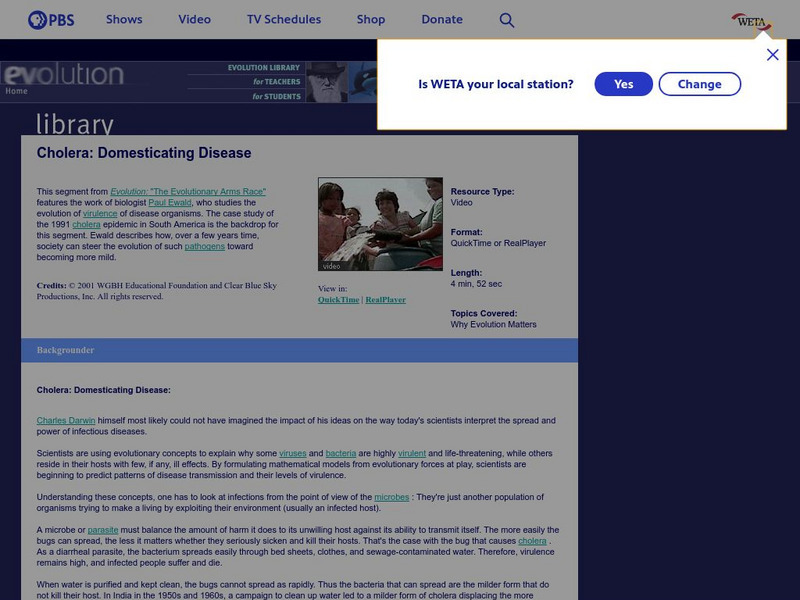Hi, what do you want to do?
Visual Learning Systems
Healthy Nervous and Endocrine Systems: Common Problems of the Nervous System
This program explores the essential components and functions of the nervous system while also investigating the endocrine system. The following parts of the nervous system are illustrated through colorful graphics: brain, spinal cord,...
Journey to the Microcosmos
We Recorded Some Strange Goop. What Is It
This week's journey comes to you unedited and in real-time as we explore a mysterious infection.
Curated Video
Is there life out there? We head to 'Mars on Earth' to find out
The Rio Tinto river snakes through the Spanish countryside for 100 kilometres, a dark, blood-red stain of acid water and rusty-looking rocks that scientists love to study. Both ESA and NASA experts regularly spend weeks in the Rio Tinto,...
Bloomberg
Why Some Germs Are Good For You
Jul.18 -- By quantity, only about half of the cells in our bodies are human. The rest are microorganisms living on or in you, and science is only now catching up to the many ways they affect our health. Bloomberg QuickTake explains what...
Bloomberg
To Find Life on Mars, Use This Space Drill
May 10 -- If we ever want to find life on celestial bodies like Mars or Europa, we're probably going to have to look far below their sterile, irradiated surfaces. Honeybee Robotics, a company that has made robotic components for every...
American Museum of Natural History
Ask a Scientist About Microbes
Microbes are the focus of 10 brief videos that showcases microbiologist Susan Perkins, who answers questions about how, what, where, and why.
American Museum of Natural History
Pondlife: Our Tiny Neighbors
Three episodes explore pondlife with microbiologist Sally Warring from the American Museum of Natural History. Videos give scholars an up-close look into the microbes that live among pond scum, algae, and moss while the host offers...
PBS
Turning Food Waste Into a Resource
One in every seven truckloads of perishable foods delivered to grocery stores gets thrown away. Is there anything that can be done with this waste? One solution is to recycle the old produce and turn it into fertilizer. The video, part...
FuseSchool
Culturing Microorganisms Part 2
After culturing microorganisms, young scientists must calculate the size of the population. Use an insightful video that offers multiple methods to solve these problems. In addition to these methods, the video highlights the importance...
FuseSchool
Culturing Microorganisms Part 1
An informative video explains how to culture microorganisms such as bacteria in a petri dish as part of the Fuse School playlist. It focuses on the need for nutrients and a proper temperature, which varies based on the location and...
SciShow
Tiny Extremophiles Living in Rocks!
From the hottest places on Earth to the coldest, from inside rocks to underground with no oxygen, this video details the extreme conditions under which living things are still able to survive.
TED-Ed
What Is the Biggest Single-Celled Organism?
Meet Caulerpa taxifolia, believed to be the largest single-celled organism in the world. How does it work and where is it found? Learn all about this invasive algae and why it is so successful.
TED-Ed
How a Few Scientists Transformed the Way We Think About Disease
During the first few sniffles of a cold, you can't help wondering where you picked up the illness. Watch an Ed Ted video that details the difference between miasma theory and germ theory, and the ways that Dr. John Snow's research...
TED-Ed
Why is Bread Fluffy, Vinegar Sour, and Swiss Cheese Holey?
The gourmands and foodies in your class will love this gastronomical video! Educational and entertaining, the video explains the natural and added microorganisms that occur with food production, including yeast in bread, carbonation in...
TED-Ed
How We Think Complex Cells Evolved
Being able to absorb the abilities of other life forms may seem like something taken from a superhero movie, but sometimes reality is stranger than fiction. Join the narrator as he takes viewers back billions of...
TED-Ed
What Causes Bad Breath?
Onions, garlic, and coffee can all have unfortunate effects on your breath, but what is the real cause of halitosis? Follow along with this video as it investigates how the bacteria that live in our mouths are responsible for these...
TED-Ed
How Do Germs Spread (and Why Do They Make Us Sick)?
Much the chagrin of mothers around the world, germs are everywhere; it's unavoidable. Learn how these microscopic invaders have evolved different ways of spreading from one host to another with this short instructional video.
Curated OER
Miracle Planet - Snow Ball Earth 3/5
Thermophiles and other microbes give hints as to how life can continue in extreme temperatures. Fossils in the Namibian Desert are relatively undisturbed and offer other keys to life. Your biology and earth science classes will want to...
Curated OER
Microbial Universe - Part 2
Part two begins right where part one left off: discussing the potential for infections from microbes. Treatment of diseases is covered as well as the steps taken to prevent infection. New bacteria and viruses continue to develop, but not...
CK-12 Foundation
Ck 12: Fungi: Fungi Plant Growth the Private Life of Plants
[Free Registration/Login may be required to access all resource tools.] Take a look at how fungi grows, gives off spores, and decays. [1:34]
Smithsonian Institution
National Museum of Natural History: Qrius: Mineral Transformations: Demystifying Microbes
Understand how microbes transform minerals in this webcast. How can microbes possibly help curb pollution? [29:16]
PBS
Pbs Teachers: Cholera: Domesticating Disease
Discover how scientists are beginning to predict patterns of disease transmission and levels of virulence. Explore how society can steer the evolution of microorganisms to weaken them.
Sophia Learning
Sophia: Early Development: Three Germ Layers: Lesson 2
This lesson will identify the three germ layers that form in an early embryo and the tissues and organs that develop from them. It is 2 of 5 in the series titled "Early Development: Three Germ Layers."























